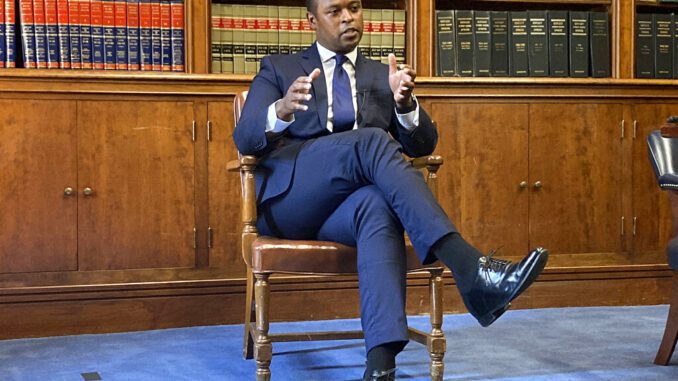
FRANKFORT, Ky. — Kentucky’s Republican attorney general lambasted the Democratic governor for pursuing what he said was a “go-it-alone strategy” to combat the spread of COVID-19, as the political rivals await a pivotal court ruling in a case testing the governor’s executive powers.
Attorney General Daniel Cameron, speaking to The Associated Press on Thursday, said his goal was to strike the “right balance” between protecting constitutional rights and public health as he defended GOP-backed laws meant to limit the governor’s authority to respond to the pandemic.
Democratic Gov. Andy Beshear, too, has talked about striking the right balance, but he has clashed with Cameron and Republicans in control of the legislature over where that threshold should lie. Kentucky has had fewer COVID-19 cases and deaths than some of its neighboring states, which took a less aggressive approach, and Beshear has said his tactics saved lives.
Beshear’s spokeswoman, Crystal Staley, pushed back Friday against Cameron’s criticism, saying the governor consulted widely with health officials — including officials from former President Donald Trump’s administration. The governor had the “courage and backbone to make the tough decisions,” she said.
On another key issue, Cameron described a possible settlement with several pharmaceutical companies as a “game-changer” in Kentucky’s battle against opioid addiction. Cameron also said he’s considering whether to seek reelection as the state’s chief law enforcement officer in 2023.
Cameron has waged legal fights against Beshear’s use of his executive authority to impose pandemic restrictions. Beshear won one round last year in the state Supreme Court.
Their latest showdown revolves around new state laws to curb those executive powers.
Beshear filed a lawsuit challenging the measures, resulting in a lower court ruling that temporarily blocked the laws. The suit reached the state’s high court, which heard arguments in June. Cameron’s criticism of Beshear’s handling of the coronavirus crisis echoed complaints from GOP lawmakers.
“What the governor has done is undertake a go-it-alone strategy,” Cameron said Thursday. “Meaning that he’s not consulted with the General Assembly. He’s certainly not consulted with this (the AG’s) office or others as it relates to any of the decision-making.”
Staley, the governor’s spokeswoman, responded Friday that Beshear administration officials have made numerous appearances before lawmakers to testify about the virus.
“At a time when we have already lost 7,300 Kentuckians to COVID-19 and the delta variant is increasing cases and hospitalizations at an alarming rate, the attorney general and other officials continue to play politics with the pandemic instead of working to protect our people,” she said.
Beshear lifted virus-related restrictions on businesses and gatherings in June. The governor says Kentucky’s economy has rebounded and is surging.
One of the laws under court review would limit the governor’s executive orders in times of emergency to 30 days unless extended by lawmakers. Under another measure, businesses and schools would have to comply either with COVID-19 guidelines from the governor or the federal Centers for Disease Control and Prevention. They could follow the least restrictive standard.
“The General Assembly said, ‘We understand that there is a health crisis, but what we want is a seat at the table so we can reflect and represent the views of our constituents,”’ Cameron said Thursday. “I respect and appreciate that they did that, and I think it was appropriate.”
Meanwhile, Cameron was upbeat about the impact of a possible $26 billion settlement with several pharmaceutical companies, stemming from the nationwide opioid addiction and overdose crisis. Kentucky’s share would be more than $460 million and could be used for intervention, treatment and recovery services.
Cameron said his office is reviewing the proposed agreement with drugmaker Johnson & Johnson and three drug distribution companies — AmerisourceBergen, Cardinal Health and McKesson. Cameron has indicated he’s optimistic the settlement will go forward.
“It’s going to be, in many ways, a game-changer,” he said Thursday.
It comes as Kentucky’s opioid woes worsened. A new report said fatal drug overdoses in Kentucky surged nearly 50% last year. It pointed to the prevalence of fentanyl and the isolation caused by the COVID-19 pandemic as key factors.
The settlement money would support efforts to “break the cycles of addiction” with treatment and rehabilitation services that “get folks back on their feet and help to restore hope,” Cameron said.
Meanwhile, Cameron said he’s still weighing whether he will run for reelection in 2023.
“I want to be deliberate in the thought process,” he said. “The conversation with my wife is paramount in these sorts of considerations. We just announced that we’re having a baby boy. So in terms of what is forefront of our minds in terms of priorities, having a healthy pregnancy and spending time with our newborn is going to be the most important thing that is upcoming for us.”



